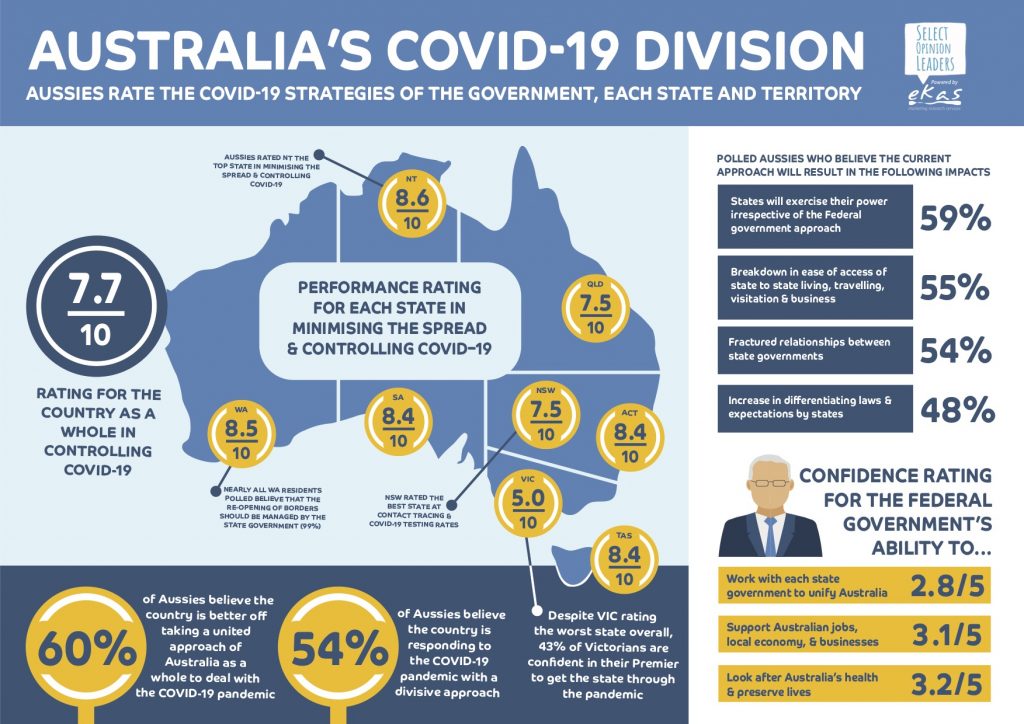The onset of the Covid-19 pandemic has segregated Australia’s states and territories in a way not seen since perhaps before the federation of states in 1901. Alongside the physical separation of border closures, the states and territories have also acquired a heightened awareness of how each state (and government) is performing in their pandemic strategies, perhaps resulting in a divide of support and camaraderie. In particular, the increased tension between the three east-coast states has Aussies critiquing not only their own state governments, but the success and failures of our neighbours.
Unsurprisingly, Victoria was the state to attract the lowest rating for minimising the spread of Covid-19, judged accordingly by both themselves (rating 5.6 out of 10) and by the nation as a whole (rating 5 out of 10). This was in comparison to scores between 7.5 and 8.6 for the other states and territories. The Victorian Premier’s office also haven’t provided much confidence for residents in their ability to organise and enforce quarantine requirements, with their rating for this being significantly lower than their eastern state counterparts (2.5, compared with NSW’s 3.6 and QLD’s 3.5).
As for each state’s trust in the Scott Morrison Federal Government; Queensland shows the most faith, with over half of Queenslanders polled having strong confidence in the government’s ability to get Australia through the pandemic (53%). NSW held a similar outlook, with 50% of residents expressing this belief, but in contrast, only 41% Victorians felt this sentiment, with 17% stating they were not at all confident in this concept. Predictably, Victoria also displayed the most negativity in the federal government’s ability to unify Australia through working with each state government, perhaps aggravated by recent portrayal of tension between the state’s Premier and Scott Morrison.
With the states separated, trade services, farming industries and cross-state businesses are unable to operate at full capacity, and there is mounting pressure coming from industries to open borders. Additionally, heartache is being felt by many families who are separated, in general, but particularly those who have experienced a loss or have been unable to say goodbye to loved ones suffering through terminal illnesses. The benefits of borders re-opening are obvious, but this wanting could be aggravating the criticism of individual states for not doing better.

While the premiers of each of the three east-coast states are competing in their ability to keep the virus under control, the federal government is keen to re-open the states for economic benefits. But how do the state’s residents feel about this? In support of the decision remaining with the state leaders, QLD residents showed the greatest support (85%), perhaps focusing on health and determined to not let any infection across their border. In comparison, NSW showed considerably less support (61%), as did VIC residents (63%), who may be more inclined to open for economic reasons, in line with the federal government goals. It is the health versus economic choices that are crippling decision-makers all over the world, and in this challenge the residents of NSW, QLD and VIC, the state governments, and federal government are finding it just as tough to agree.
Regardless of if the states residents are more focussed on health or economy, when considering the confidence ratings for their state leader’s capabilities, residents of all three east-coast states show greater faith in their government’s ability to support health rather than economy. QLD and NSW both rated their Premier’s offices a 3.6 confidence rating on the competence to look after the state’s health and preserve lives, and VIC residents gave their leaders a 2.9. For their ability to support business, jobs and local economy, QLD rated their government a 3.0, NSW residents rated a 3.3, and Victorian residents rated a 2.6.
Could Covid-19 have the potential to create an on-going divide between our states and territories? In fact, 40% of Aussies polled believe that Australia’s current approach to the pandemic will lead to discrimination of individuals from a specific state, due to that state’s response and coping with COVID-19 outbreaks. It’s clear all the states will benefit from border’s opening, but not at a cost of health, and with 60% of Aussies agreeing that as a country we would be better off taking a united approach, there is still a lot of sense and support for sticking together.
Ekas surveyed 904 residents across Australia in September on it’s Select opinion Leaders panel.
